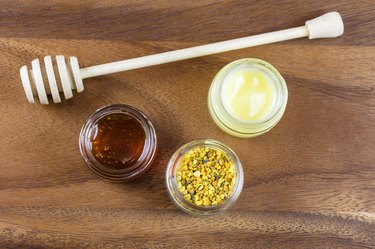
Royal jelly, a jelly-like substance produced by bees, is known for its purported beneficial qualities ranging from vitamins to regrowing hair. But royal jelly's vitamins include just B5 — compared with complete B-complex, a dietary supplement that contains all eight of the necessary B vitamins.
Tip
Royal jelly, which comes from worker bees, contains vitamin B5, while complete B-complex is a dietary supplement that contains all eight of the essential B vitamins needed to support overall health and form red blood cells. The two are not interchangeable.
Video of the Day
Royal Jelly Benefits
Royal jelly is produced by worker bees, to feed the queen bee. Royal jelly is also fed to the honeybee larvae upon hatching, and helps to nurture the brood. It is not the same as apitherapy, bee pollen or bee venom. Royal jelly contains pantothenic acid, or vitamin B5.
Video of the Day
According to the University of Michigan Medical School, royal jelly has been used in alternative medicine for years, to treat a variety of conditions including menopausal and premenstrual symptoms, hay fever, infertility, high cholesterol, diabetic foot ulcers, stomach ulcer, pancreatitis, liver or kidney disease, asthma and skin disorders. Although it is typically sold as a dietary supplement, the FDA has not approved royal jelly for medicinal use, and there is currently no scientific evidence to support its medicinal use.
There is also some belief that there are royal jelly benefits for hair — mainly, that when it is applied to the scalp, it acts to stimulate royal jelly hair regrowth — but this has not been proven.
Royal jelly is being studied for its possible antibacterial, antitumor, antiallergy, anti-inflammatory, and immunomodulatory effects, most of which stem from its bioactive compounds, according to a July, 2017 article in the journal Oxidative Medicine and Cellular Longevity. It's important to note that the majority of studies cited in the article were performed on animals, and further research is needed to absolutely prove the health benefits of royal jelly.
B-Complex Benefits
B-complex is a nutritional supplement that contains all eight essential B vitamins. These supplements are available in pill, powder, liquid, time-released and chewable forms. Harvard University's The Nutrition Source describes the function of B vitamins as helping a variety of enzymes to do their jobs, from releasing energy in carbohydrates and fat, to breaking down amino acids and transporting nutrients around the body.
B vitamins also help form red blood cells. You can get B vitamins from proteins such as fish, poultry, meat, eggs and dairy products, the National Institutes of Health note. Other sources of B vitamins include leafy green vegetables, beans, peas and cereals or bread, which often has added B vitamins.
If you feel you are not getting enough B vitamins through your diet, you may wish to investigate using a supplement. The vitamins in B-complex are:
- B1 (thiamine)
- B2 (riboflavin)
- B3 (niacin)
- B5 (pantothenic acid)
- B6
- B7 (biotin)
- B12
- Folic acid
The recommended daily allowance outlined by the 2015-2020 Dietary Guidelines lists the recommended daily dose for each B vitamin as ranging from 3 micrograms, per day, for vitamin B12 to 18 milligrams, per day, for vitamin B3.
Royal Jelly Vs. B-Complex
Royal jelly and B-complex are two entirely different entities. Whether royal jelly's vitamins are beneficial to health is still unproven; while royal jelly does contain vitamin B5, B-complex as a nutritional supplement contains all eight of the essential B vitamins needed for daily health. In short, royal jelly is not equal to B-complex.
B vitamins are considered water-soluble vitamins, which means that any surplus gets flushed out of your system (in other words, B vitamins are not stored in your body). If you eat a varied diet, with a lot of vegetables, whole grains and lean proteins, you will probably obtain enough B vitamins through food sources — which is recommended. If you eat a vegetarian or vegan diet, you may wish to supplement with vitamin B12, as plants do not produce B12.
If you feel like you have a deficiency, you should speak to your doctor. Symptoms of vitamin B12 deficiency can include numbness or tingling in the hands, legs, or feet, balance issues, anemia, cognitive difficulties or memory loss, weakness and fatigue.
- Oxidative Medicine and Cellular Longevity: "Honey, Propolis, and Royal Jelly: A Comprehensive Review of Their Biological Actions and Health Benefits"
- National Institutes of Health: "B Vitamins"
- Office of Disease Prevention and Health Promotion: "2015-2020 Dietary Guidelines"
- Harvard University, The Nutrition Source: "B Vitamins"
- Michigan Medicine University of Michigan: "Royal Jelly"
- U.S. National Library of Medicine: "Pantothenic Acid"
- Harvard Health Blog: "Vitamin B12 Deficiency Can Be Sneaky, Harmful"
- National Cancer Institute: "B Complex"
Was this article helpful?
150 Characters Max
0/150
Thank you for sharing!
Thank you for your feedback!